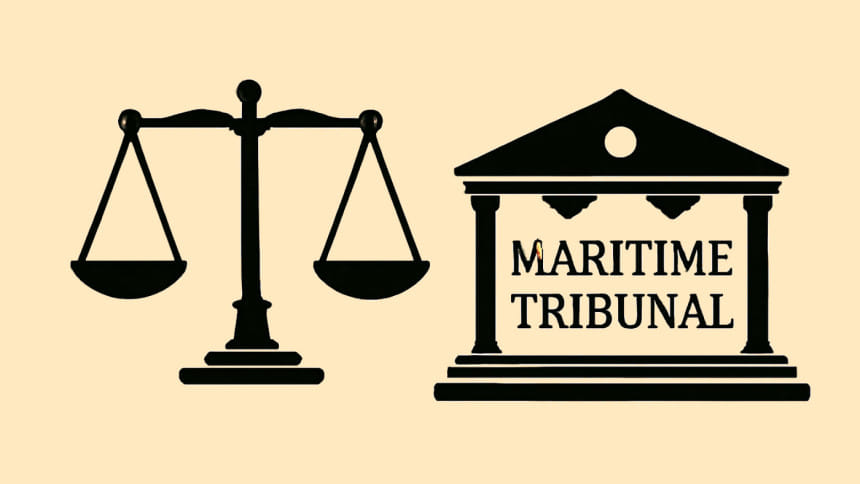Fragmentary approach toward maritime tribunals

After 47 years, the Territorial Water and Maritime Zones Act of 1974 had been updated with a lengthy amendment back in 2021. Following the enforcement of the Bay of Bengal cases and ratification of United Nations Convention on the Law of the Sea in 1982, the Territorial Waters and Maritime Zones (Amendment) Act of 2021 came into force. One of the aims of this Act was to carry out the duties described in Article 143(2) of the Constitution where it is stated that the Parliament may from time to time by law provide for the determination of the boundaries of the territory of Bangladesh and of the territorial waters and the continental shelf of Bangladesh. This updated legislation has introduced several new definitions, including Continental margin, Convention, dumping of waste, Martine Pollutions Installations, Internal Waters, Maritime Zones, Maritime Tribunal, Blue Economy, Waste, and Warship etc. and tried to bring domestic legislation into compliance with UNCLOS.
The introduction of a new adjudication system named Maritime Tribunal ushered in high hopes for strengthening ocean governance in the country. With an aim to safeguard the marine ecosystem, conserve marine biodiversity and to ensure accountability for any crimes committed within maritime boundaries Section 27 of the Act envisaged establishment of one or more maritime tribunals across the country. Sadly, after 4 years of entering into force, any tribunal of this nature is yet to be established.
The law also prescribes that the Government may appoint any district Judge or additional district judge to adjudicate in the Maritime Tribunal, after consulting with the Supreme Court. However, this Act does not ordain establishment of a distinct or independent maritime tribunal rather the judges will perform the duties of the tribunal, in addition to their own duties.
Apparently, the legal promise of establishment of maritime tribunals is facing a dead end. Even if the current provisions are enforced, there will be limited benefits to be shared by the justice seekers. It is high time that the promised tribunals be established and accessibility to environment justice is ensured.
Moreover, Section 30 of the TWMZ (Amendment) Act, 2021 has shown a restrictive approach in case of access to justice before maritime tribunal. This section bars the ordinary citizens to file a case to the tribunal directly. Rather the tribunal can take cognizance only when written complaint is submitted by the duly authorised person by the government.
Another limitation of this Act is that "the duly authorized person by the Government" is not specified. Furthermore, there is no mention of knowledge, specialisation, or qualifications of judges of this tribunal. Due to these obstacles, the victims are unable to seek remedy through accessing environmental justice under TWMZ (Amendment) Act, 2021.
Admittedly, this amended Act has introduced many new offences; for instance, any individual/ legal entity or foreign company, who commits any of the specified acts in Bangladesh's Maritime Zones, such as discharging pollutants to sea without following the provisions or affecting the marine environment in coastal areas, shall be imprisoned for a maximum of three years or fined between 2 crore and 5 crore Taka or both. However, without the establishment of tribunals, the victims will not get justice, and this Act will remain unvalued and only in the statute books.
In conclusion, the TWMZ (Amendment) Act 2021 has taken a fragmentary approach to maritime justice. It needs thorough and critical scrutiny in case of ensuring access to justice before the maritime tribunal. The provisions of this Act must be amended, and additional provisions should be included for ordinary people so that the tribunals are more approachable and accessible. Apparently, the legal promise of establishment of maritime tribunals is facing a dead end. Even if the current provisions are enforced, there will be limited benefits to be shared by the justice seekers. It is high time that the promised tribunals be established and accessibility to environment justice is ensured. Only then will it function as the key to protect the marine ecosystem, preserve marine biodiversity, prevent criminals from committing any crimes and hold accountable the marine polluters.
The writers are lecturer, Department of Law, University of Information Technology and Sciences (UITS) and Assistant Professor, Department of Law, Bangladesh University of Professionals.

 For all latest news, follow The Daily Star's Google News channel.
For all latest news, follow The Daily Star's Google News channel. 



Comments